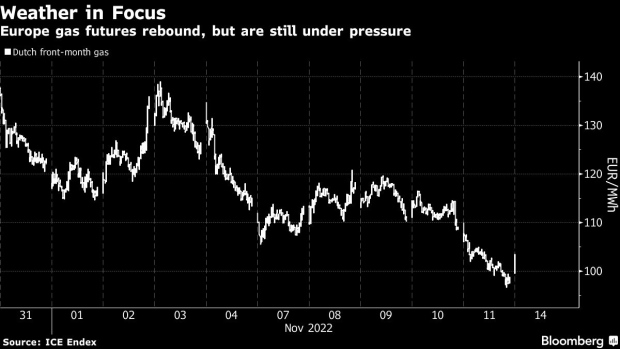Nov 14, 2022
European Gas Rebounds With Focus on Weather, Supply Risks
, Bloomberg News

(Bloomberg) -- European natural gas surged on forecasts for colder weather and as supplies from Norway, the continent’s top exporter, are crimped by outages.
Benchmark futures jumped 16%, recovering from a 14% slump on Friday. After a long period of unusually mild weather, temperatures are set to dip below average toward the end of the week, with Berlin expected to plunge beneath zero, according to forecaster Maxar Technologies LLC. That should force people to start using heaters, boosting gas demand.
EUROPE WEATHER: Short-Lived Cold Snap Forecast for Berlin
In addition, fuel flows from Norway dropped with two facilities having process issues. The nation’s Asgard field, shut after a fire on Sunday, is not expected back online until Nov. 19, according to network manager Gassco.
Dutch front-month gas, Europe’s benchmark, settled at €113.70 a megawatt-hour. The UK equivalent futures gained 19%, also rebounding after a sell-off last week.
Click here for the Europe Energy Crunch blog
Gas prices are bouncing back, lifted by weather forecasts and Norwegian outages, “with valuations showing signs of being oversold on Friday,” analysts at DB Group Europe said in a note. But with longer-term outlooks still pointing to healthy supplies they will “eventually have to cave into the bearish pressure,” they said.
Winter Outlook
Benchmark rates have halved in the past few weeks as ample deliveries of liquefied natural gas, reduced consumption and brimming stockpiles spur confidence Europe may avoid shortages this winter.
The continent also has a greater probability of significantly higher temperatures than normal this winter, according to the European Union’s Copernicus Climate Change Service.
“The outlook for winter 2022/23 has been helped by a very mild October, with demand more than 20% below normal,” analysts at Deutsche Bank AG said in a note. “While there are some uncertainties on LNG availability over the coming year, this is a positive sign.”
Still, many officials are warning that the crisis is far from over as global gas supplies remain tight, and next winter could be more challenging. That’s keeping the market nervous about a thin cushion and future volatility -- in case of a supply disruption or a cold wave -- even in the coming months.
--With assistance from Anna Shiryaevskaya.
©2022 Bloomberg L.P.






